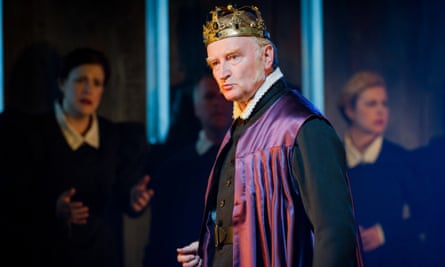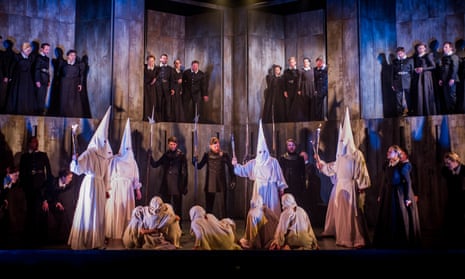This is Grange Park Opera’s last season at its current address. The company will up sticks and relaunch at West Horsley Place in Surrey next year, while at the Grange itself a new festival directed by the countertenor Michael Chance will commence operations.
What Grange Park has achieved over the last 18 years under the leadership of founder Wasfi Kani is evident in the high quality of this production of Verdi’s largest and most ambitious opera by director Jo Davies, with the Bournemouth Symphony Orchestra on assured form under the focused baton of Gianluca Marcianò.
Written for the well-equipped Paris Opera – which the Italian composer termed “la grande boutique” – Don Carlo continues to be performed in authentic editions of different shapes and sizes. Substantial cuts were made even before the Paris premiere in 1867, and almost all productions today lose its 15-minute ballet sequence. The entire first act had also disappeared in an 1884 revision for Milan, where it was translated into Italian. This is what we get at Grange Park. The result remains a mighty torso, though the loss of act one hinders a thorough understanding of the drama’s complex central relationships, and Verdi was surely right when he decided to reinstate it.

Davies’s direction is generally astute, as searching in the work’s many intimate encounters as in the spectacular centrepiece of the public celebration of the auto-da-fé, which in Leslie Travers’s set design ends with an immolation of heretics more brutally convincing than in many far grander productions. Sombrely dressed either as courtiers, soldiers, monks of the inquisition or their pathetic victims – all clearly defined in Gabrielle Dalton’s costumes – the chorus sounds terrific in this vast, magnificent and gruesome scene, brilliantly lit by Anna Watson.
The standard of the principal roles is more mixed. As Verdi’s vacillating and mentally unstable antihero, Stefano Secco could do with more vocal power and conviction, while Virginia Tola’s Elisabetta feels similarly limited in conception and execution.
David Stout, however, brings humane concern and impetuousness to bear on the far-sighted liberal Rodrigo, while Ruxandra Donose’s dynamism and flair create a glamorous, dangerous Eboli. In resplendent voice, Clive Bayley shines an interpretative light deep into the murky soul of Filippo II, and Alastair Miles’s loathsome Grand Inquisitor is precisely the monster Verdi intended him to be without ever sliding into caricature. It is unfortunate that both of them are involved in the messy and implausible final moments of Davies’s production, when her previously sure touch momentarily deserts her. Who or what Jihoon Kim’s mysterious Monk is meant to be at this point is anyone’s guess.
Yet taken as a whole, this is a gripping evening that maximises the resources available to the company in a successful realisation of a piece that in theory ought to be well beyond its reach.

Comments (…)
Sign in or create your Guardian account to join the discussion